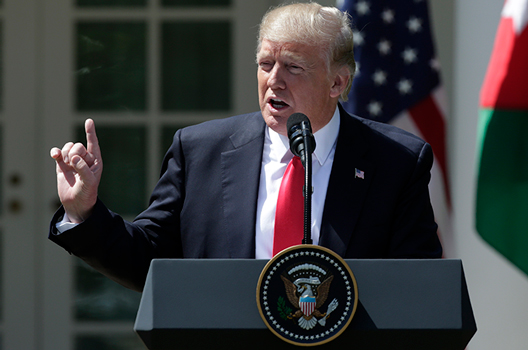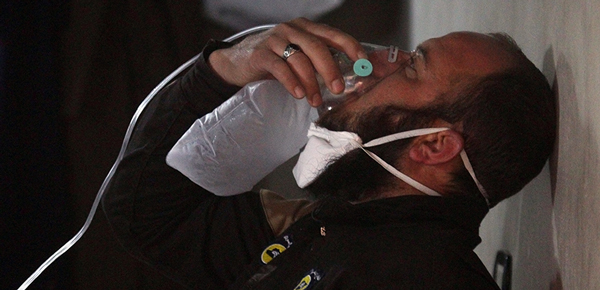 The United States has limited options when it comes to responding to the deadly chemical attack likely carried out by Bashar al-Assad’s regime in Syria’s Idlib province on April 4, according to an Atlantic Council analyst.
The United States has limited options when it comes to responding to the deadly chemical attack likely carried out by Bashar al-Assad’s regime in Syria’s Idlib province on April 4, according to an Atlantic Council analyst.
The international community has so far imposed sanctions on Syria, which haven’t worked, said Faysal Itani, a senior fellow with the Atlantic Council’s Rafik Hariri Center for the Middle East. “There is diplomacy, which in fairness we’ve been trying for a long time… That leaves the military option, or the military option combined with diplomacy. That’s something we haven’t done.”
If the military option is chosen, “We would either have to build an indigenous proxy force that can fight properly, or [the United States] and our allies have to do something in the country,” said Itani. The alternative to military and diplomatic action, he said, is “nothing. Those are our options.”
[UPDATE: The United States on April 6 carried out a missile strike in Syria in response to the chemical weapons attack. US President Donald J. Trump said he ordered the strike because it is in the “vital national security interest of the United States to prevent and deter the spread and use of deadly chemical weapons.”]
Itani said reliable sources have confirmed that some kind of nerve agent, most likely sarin gas, was used in the attack on the Syrian city of Khan Sheikhoun on April 4. Nearly fifty civilians, including eleven children, were killed.
The Assad regime is the likely culprit, said Itani, simply because the rebels do not have sarin gas or the means to produce it.
World leaders have condemned the attack, which they have blamed on the Assad regime. Trump called the attack “an affront to humanity” that “could not be tolerated.”

A civil defense member breathed through an oxygen mask after what rescue workers described as a suspected gas attack in the town of Khan Sheikhoun in rebel-held Idlib, Syria, on April 4. (Reuters/Ammar Abdullah)
Trump has expressed an interest in reconciling with Russia, which has provided military support to the Assad regime, suggesting that the White House and the Kremlin could find a point of common interest in the fight against the Islamic State of Iraq and al-Sham (ISIS) and other extremist groups in Syria.
The Kremlin said the Assad regime was not responsible for the chemical attack. Russia’s defense of Assad puts Trump in a difficult position, said Itani. A challenge to Assad, and by extension Russian President Vladimir Putin, poses the risk of escalation with Russia.
Faysal Itani spoke in an interview with the New Atlanticist’s Rachel Ansley. Here are excerpts from our interview.
Q: Who is likely behind this attack?
Itani: From the symptoms of the victims, who have been examined by reliable sources, it appears that a nerve agent, most likely sarin gas, was used. The opposition does not have sarin gas or the means to produce it. The party that has it is the Syrian regime. Its stocks were supposed to have been given up to the OPCW [Organisation for the Prohibition of Chemical Weapons] per the Russian-American agreement in 2013. Obviously, it’s kept some; that’s not very surprising. It’s slightly more surprising that they actually used them.
Q: Why is Idlib important to the Assad regime? Will it become the next Aleppo?
Itani: Idlib is the last large area in western Syria that’s fully controlled by the armed opposition. From Idlib, the opposition has been launching ground offensives into key regime areas. Securing this western half of Syria is the regime’s priority. Idlib is the thorn in their side. It has to eventually be taken; it has to eventually be subdued.
It’s not like Aleppo in that it’s much more rural; it has no large cities, and it has a much more difficult geography. Taking it yard by yard would be very costly. It calls for a different strategy than the one used by the regime to take Aleppo.
Q: President Trump has been critical of former President Obama for not sticking to his red lines regarding the use of chemical weapons in Syria. How will the Trump administration respond to this chemical weapon attack?
Itani: It’s hard to say because [Trump] has been critical of President Obama both for not sticking to the red line, as well as for having gotten us involved in the Syrian conflict to begin with. On the other hand, he also thinks the entire Syria venture is a bad idea, and he wants to reconcile with Russia over it. He wants to keep Assad in [power] because Assad is not as bad as ISIS, and Assad is fighting ISIS.
Q: Who controls the ground in Idlib?
Itani: It’s mostly Jabhat Fateh al-Sham; it’s the al-Qaeda derivative in the Idlib province, a Salafi group called Hayat Tahrir al-Sham, and a constellation of smaller vetted groups. Not all of them are ideological; some of them have actually received US support in the past.
Q: Will the fact that al-Qaeda affiliates control the ground in Idlib shape the US response?
Itani: That’s always been a complicating factor for the United States. Originally, the Obama administration was very worried by it, and had to shape its strategy around the expectation that if the regime fell, these were some of the groups that were likely to be empowered, and would maybe even control the country.
For the Trump administration, their definition of the range of “unacceptable” Islamist actors is even wider than the Obama administration’s was. It’s even more likely that they would hesitate to act in Syria decisively against the regime for that reason.
Q: How will Putin’s defense of Assad impact Washington’s stance toward Russia?
Itani: When the Russians started to intervene in a substantial way in Syria in October 2015, it changed things for the United States. Not that we were doing much before, but after that, taking aggressive action against the regime began to carry the risk of counter-escalation by Russia. It doesn’t mean it would be World War III, but it’s a new element of the equation that complicated things.
Russia is standing by Assad now, rhetorically. They have to do that because they can’t say “Our client used chemical weapons” because that undermines their entire case for helping him. It’s interesting to ask whether Russia would at least let us do something against the regime, knowing it’s a finite action that has a beginning and an end, and is not aimed at toppling the regime.
Q: What actions can the international community take in response to this attack?
Itani: The problem is the international community doesn’t have a lot of options. They have sanctions, which haven’t worked and haven’t been extreme enough. There is diplomacy, which in fairness we’ve been trying for a long time. The main reason we haven’t succeeded is because one party in the conflict is in a much better position than the other, and has no reason to compromise over anything or to make any concessions. That leaves the military option, or the military option combined with diplomacy. That’s something we haven’t done. Now what are we left with? We either have to build an indigenous proxy force that can fight properly, or [the United States] and our allies have to do something in the country, either seize territory to turn it into a safe zone, draw real red lines for the regime, or nothing. Those are our options. We don’t have many.
Q: Will this chemical attack be an inflection point that pushes the international community to take some of those concrete steps, rather than sit back and do nothing?
Itani: This is [the Trump administration’s] first serious foreign policy crisis, and we don’t know whether or not the rhetoric that they use is an indication of their policy preferences. The president uses contradictory rhetoric, so it’s really hard to see where he’ll fall.
Rachel Ansley is an editorial assistant at the Atlantic Council.
Image: US President Donald Trump speaks about the gas attack in Syria as he and Jordan's King Abdullah (not pictured) hold a joint news conference in the Rose Garden after their meeting at the White House in Washington, US, April 5, 2017. (Reuters)
